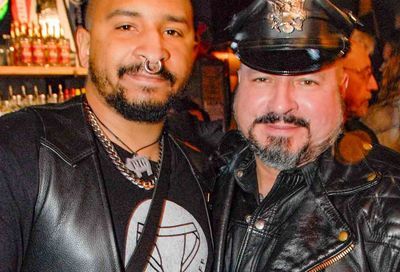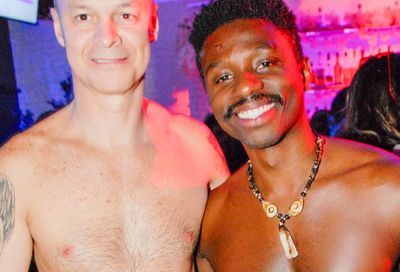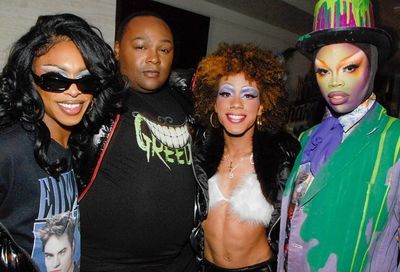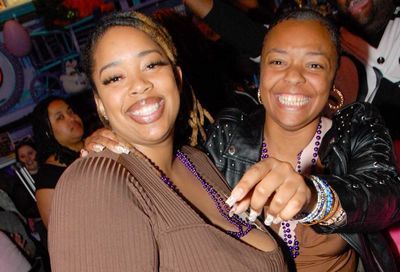8 Questions for ‘Stacy’s Brother’ Musician Mad Tsai
Mad Tsai talks about the making of his catchy single "Stacy's Brother" and its athletic and sensual video.

Sometimes, something that’s already great becomes just a bit better by making it gay.
Or, if not better, at least more appealing to an audience not yet really familiar with seeing itself represented authentically in media. This is exactly what singer-songwriter Mad Tsai wanted to do with his single “Stacy’s Brother,” an even sexier reworking of the early-aughts pop-punk staple “Stacy’s Mom” by Fountains of Wayne.
The musician quickly went viral with his catchy cut and the athletic and sensual video he released in tandem.
Following the incredible success he enjoyed with the tune, we spoke with Tsai about how he came up with the clever idea, making the visual (which took much longer than you might think), and whether he wants his sexuality to define his musical output.
How would you describe your music to someone who hasn’t heard it before?
I would describe my music as pop songs that tell a story. I’ve always been a fan of stories and cool concepts, and that’s something that I integrate in my music a lot.
How did the idea for “Stacy’s Brother” come about?
I was in the shower and I had this melody stuck in my head [the “I’ve been hanging out with…” verse melody], and I was just singing random lyrics until I stumbled upon the idea of writing a song that pays homage to Fountains of Wayne’s “Stacy’s Mom.” I remember I ran out of the shower just so I could grab my phone and record a voice memo of it. It probably sounds awful now that the song is completely realized, but it did really help me get started on writing this song.
The video is what really sells me on this song! Talk about the process of creating it, from idea to release.
After seeing the acoustic version of “Stacy’s Brother” blow up, I realized that it had to be a single on my next project with a killer music video. I had so many specific shots in mind of what I wanted to do with this video and crazy concepts that I wanted to explore. The first shot that I specifically wanted was at the end of the second chorus [“I hooked up with Stacy’s brother…”] where I walk over to Stacy’s brother and we make out and go off screen.
I also specifically wanted a lot of male extras that were going to be shirtless and in a lot of suggestive scenes. It’s so common for women to be sexualized in the background of male artists’ music videos, so I wanted to turn the tables and have a queer person of color be at the center of a music video with male extras.
I wanted the video to be suggestive and sexy, since that’s not often a light that Asian men are portrayed in.
I wrote the treatment for the music video over a year before we filmed it, and we slowly made tweaks in order to fit our budget, which was completely independent.
The pre-production stage was grueling work, but I’m so glad that our amazing crew was able to make it happen. Eliot Lee, our director, did such a fantastic job bringing my vision to life and being an amazing person throughout the whole process. I cannot say enough good things about him and the rest of our cast and crew on the video.
At the end of the whole process, I’m so happy with the final product and I thank everyone who was involved in making it happen.
Is the original “Stacy’s Mom” a favorite of yours?
Of course! It’s a classic and I wanted to pay homage to such an iconic song while putting my own twist on the concept. I remember watching the original music video for “Stacy’s Mom” and being completely shocked as a kid.
What have you heard from fans in terms of feedback of your song and video?
The reception of the song and video has been really positive! I worked really hard on the song and video and most people have shown their support for that. But at the same time, there’s been a lot of attention, both good and bad, on everything. The song and video blew up and put me on a new level of popularity, which was something I wasn’t expecting.
I remember talking with a friend recently about how before the song came out, I had a pretty small fanbase and lived inside a bubble. It’s fair to say that “Stacy’s Brother” has since popped that bubble. This is the first time I’ve seen edits, fancams, fan pages, etc. It’s all been so surreal.
But at the same time, I’ve always gotten a taste of the darker side of becoming more mainstream.
I’ve gotten lots of homophobic and racist comments, death threats from K-pop stans, and people trying to make fun of my appearance and personality online. I would be lying if I said that those comments didn’t hurt me. For a whole week I barely talked to anyone. I wasn’t eating. And I wasn’t taking care of myself because all I could think of were a bunch of comments by people trying to roast me online.
While I do appreciate some of the comments that have encouraged me to work harder on my craft and make my next songs even better, it’s been bittersweet.
Seeing nasty comments on my body, face, voice, etc. and people making awful assumptions of me is never easy, but it’s something I’m coming to terms with as I’m growing as an artist. The internet is a really negative place, but I’m learning to focus on the positive while also using constructive criticism to push myself even harder as an artist.
How do you identify?
I identify as queer or bi.
A lot of your work seems to focus on your LGBTQ identity. Why do you feel it’s important to highlight that?
Surprisingly, I’ve actually tried to focus less on my LGBTQ identity as a focal point for my music. I released “Boy Bi,” which was a song I wrote after I graduated high school that solely focused on my sexuality and putting a label on myself. I really appreciate where that song has taken me and what it has meant for a lot of young queer kids, but I felt a lot of pressure from people to constantly make my sexuality the basis of my career and music, when that’s not at all what I’d like to do.
Yes, I want to be open about my sexuality and be a role model for young kids who are figuring themselves out. However, after “Boy Bi,” I made sure not to explicitly talk about my sexuality or label myself. I really just want to normalize LGBTQ+ love in my songs and make it a casual topic, without making it the entire purpose of my songs.
“Killer Queen” and “Stacy’s Brother” have elements of queer love and relationships, but at the end of the day, I just want to make pop songs that everyone can enjoy. There’s so much more nuance to my music, and I want people to appreciate that.
What do you want to do next in your musical career? What else do you have coming up?
I have a lot of plans. I definitely want to make a concept album that releases alongside a short film or visual album. I love putting myself to work and creating something that’s larger than life, and that’s exactly what my goals are beyond this next project. I have a few ideas of what I want to do for my debut album, but I’m gonna keep that a secret until it comes time for release. As for now, I’m getting ready to release more singles and music videos, along with my next project.
Support Metro Weekly’s Journalism
These are challenging times for news organizations. And yet it’s crucial we stay active and provide vital resources and information to both our local readers and the world. So won’t you please take a moment and consider supporting Metro Weekly with a membership? For as little as $5 a month, you can help ensure Metro Weekly magazine and MetroWeekly.com remain free, viable resources as we provide the best, most diverse, culturally-resonant LGBTQ coverage in both the D.C. region and around the world. Memberships come with exclusive perks and discounts, your own personal digital delivery of each week’s magazine (and an archive), access to our Member's Lounge when it launches this fall, and exclusive members-only items like Metro Weekly Membership Mugs and Tote Bags! Check out all our membership levels here and please join us today!























